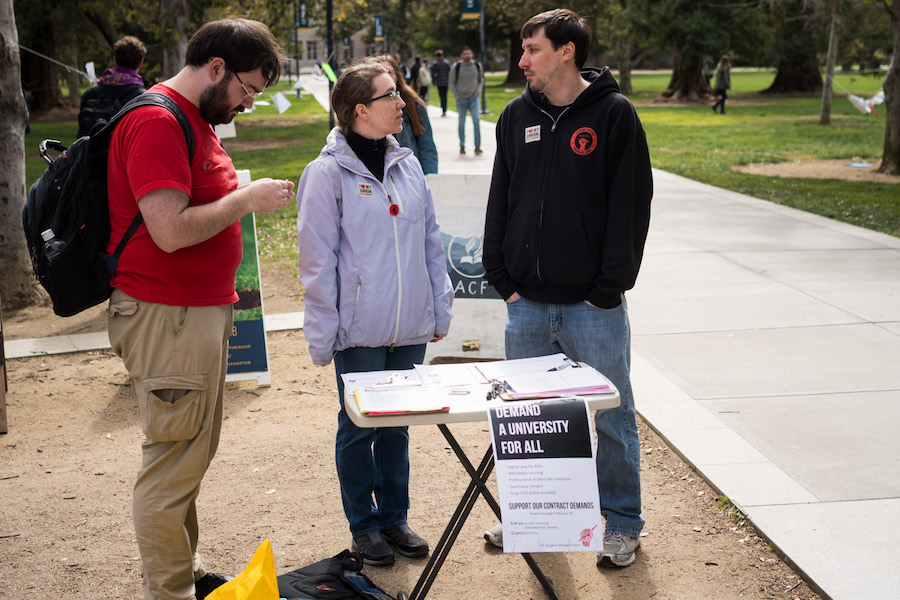
Student-Workers hope to shift current power structure of UC
The UC Student-Workers Union (UAW Local 2865) at Davis hosted the first day of contract negotiations on Feb. 28 at the Memorial Union. UAW 2865 represents more than 14,000 academic student employees across UC campuses. Students presented their demands, which will be heard at the formal negotiations held at UC Berkeley.
The UC Student-Workers Union represents teaching assistants, associate instructors, lecturers, readers and undergraduate tutors across all nine UC campuses.
Demands include maintaining wages to keep pace with rising costs of living, ensuring regular and consistent pay and benefits, increasing access to public transportation and parking as well as aiming to extend current Academic Student-Employee benefits. Beginning six months before their current contracts expire, graduate students and members hope to reach an agreement with administration soon. Although agreements are usually reached through a lengthy process of weekly meetings at different UC campuses, sometimes administrators and student-workers fail to come together before the current contract expiration.
The group also aims to ensure ASEs have access to affordable housing and protect UC students and workers by declaring all UCs sanctuary campuses. It also hopes to further efforts to promote diversity, inclusivity and safe workplaces, extend childcare benefits and expand union rights, while maintaining all currently existing rights.
Civil engineering graduate student Ellie White became involved with the Student-Workers Union after her own access to secure housing was threatened.
“Our houses are going to be torn down in 2020,” White said. “Solano Park is the only semi-affordable place left to live on campus and the university is trying to replace it with units that will be much, much more expensive.”
Looking forward, White is hoping to see housing reform demands come to fruition during negotiations.
Ph.D. sociology candidate Duane Wright is another member of the UC Student-Workers Union. Wright aims to tackle the clear relationship between the union’s demands and the failure of the university to meet students’ demands.
“I see all the issues as interconnected, stemming from the undemocratic and mostly corporate nature of the university system,” Wright said. “It’s absurd that there’s an executive class that makes hundreds of thousands per year, mismanages mental healthcare funds and pepper-sprays protesters; meanwhile, students are paying more than ever and class sizes are increasing.”
Amara Miller, a Ph.D. candidate in sociology, has been a member of UAW 2865 since entering the Ph.D. program in 2011. Miller described past issues reaching an agreement.
“Our last contract campaign in 2013-2014 lasted around a year and wasn’t resolved until after several strikes and strike threats,” Miller said.
Many students enrolled in the UC system will be taught at some point in their undergraduate careers by graduate students and lecturers.
“Graduate students are responsible for nearly half of all instructional hours at the UC system and are often the main point of contact between students and faculty,” Miller said.
Although student-workers are committing to achieving all of their demands, Miller in particular is concerned about ensuring affordable housing for students, an issue for undergraduate and graduate students alike. With a significant portion of graduate student and other union members’ paychecks allocated to paying rent, many are left without sufficient funds to pay for food, health care and other life necessities.
“Our membership has been reporting that most pay over 50 percent of their income on rent, with many paying more than 75 percent and some paying literally 100 percent of their income just for rent, while being forced to take out loans just to afford food and other necessary living expenses,” Miller said.
Written by: Ally Russell — campus@theaggie.org




